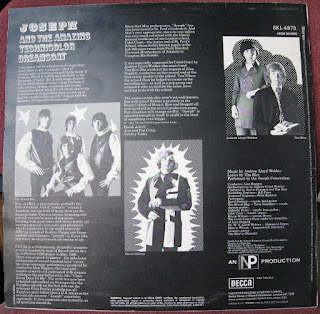Tangerine Dream - "Rubycon" (1975)
Dope music, I used to call this kind of music when I was younger. The musiscians probably did drugs. The ones listening to the music did drugs. This was a compliment. The music was different, alternative and druggy. It attracted me. At the same time I had, as a teenager, a somewhat hard time with the Tangerine Dream albums. I listened a lot to early Pink Floyd and other psychedelic albums, but Tangerine Dream's instrumental records were a little too formless, shapeless and vague. I guess I missed a clear hook to cling on to. The albums of Tangerine Dream often stood a long time in the shelf witout getting any air time. Maybe I didn't do enough drugs?
Today I think differently about this record. It's a really great album.
Tangerine Dream is a German band that was formed in 1967, and Rubycon was their sixth studio album (if I've counted correctly). The previous album Phaedra had been a great success. Edgar Froese has been the steady member in the band and at the time of recording of Rubycon the band consisted also of Christopher Franke and Peter Baumann.
The band is still active today and has released over one hundred albums since its creation, and if you also count singles and compilations, the number is over two hundred.
Rubycon consists of two songs, one on each side of the album - Rubycon, Part One and Rubycon, Part Two. Simple and logical. The album has a total time of about 35 minutes which is enough. It had been a long time since I played this album, and when I a few weeks ago listened to it, I was surprised how good I thought it was. It has spun a number of times on the turntable since. Synthezeisers and the 70's can go in any direction, but in this case a really nice sound. There is a ceratin attraction to the early development of synth-based music that was largely lost in the 80's. Rubycon takes the listener on a journey that passes through peaceful landscapes, dark and neurotic chambers, harmonic fields and steady pulses. And even though the instruments have evolved tremendously since those days, Rubycon might sound even more beautiful than today's electronic music. Perhaps it is the relative simplicity of the sounds that attracts?
The music can be described as a mix of early Pink Floyd (think Echoes or Time), and Kraftwerk. More electronic than Pink Floyd but druggier than Kraftwerk. Make David Lynch the producer of some darker parts of the record and maybe you'll have a picture of what it is. The music creates a nice wholeness, and even though there are two long songs I don't get tired of the music. The road the music travels on always feels logical and the changes that occur are so integrated that there's no doubt that it's one and the same song. It's like a smooth dark river that flows, it turns here, it turns there, there are rapid parts, there are slow parts, but it is one and the same river.
It's a dark and calm album, although a steady pulse beats in parts of the songs. Rubycon is as much atmosphere as songs, and I think Tangerine Dream finds a good balance between these focuses. Sometimes albums /songs like these have parts that are mostly a chaos of sounds with no structure, I usually don't enjoy such parts. Luckily, Rubycon doesn't have these parts. I would say it's an enjoyable album all the way through even though some parts are less interesting than others.
For some reason, I get a summer vibe from this album, which also happens when I listen to Edgar Froeses solo albums. I don't know why. Maybe I have listened to this album during the summer as a younger man.
I recommend Rubycon. It is a half mystic, beautiful creation that works well a dark winter evening or a sunny summer day. It's a cool sound and the clear 70's stamp only enhances the experience.
And the 70s must have been a fun time when albums like these could spend time on the charts (14 weeks on spot #12).
Tracklist
Side A
1. Rubycon, Part One 17:18
Side B
1. Rubycon, Part Two 17:35

















